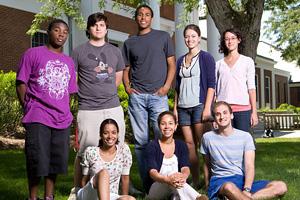July 27, 2009
It was a rare sunny day in early July, and most of the windows and doors on the second floor of Chapin Hall were propped open. Warm breezes flowed through the hallways, circulating the sounds of young people talking and laughing—and learning.
In one classroom, seven Amherst Regional Middle School (ARMS) students and two Amherst College interns listened to teacher Maria Moses explain the morning’s lesson about the poem “Where I Come From,” by George Ella Lyon. She asked the rising ninth- and tenth-graders to read the selection twice and then write their own poems with a similar theme.
 The Summer 2009 Pipeline Program Interns |
“What’s a ‘family trait?’” asked one the students at Williams’ table a few moments later.
Williams paused. “It’s something that describes you, your parents and your siblings or your house, maybe,” she explained. “Try thinking of sensory details—like how things smell or taste or feel.”
The middle-schooler, one of 67 ARMS students on campus this summer participating in the Pipeline Scholars Program, thought for a minute, smiled and began scribbling furiously.
Pipeline, a collaboration between the college and Amherst Regional Public Schools (ARPS), identifies young people in need who meet certain criteria involving academic performance, family income and several other factors, and matches them up with Amherst College resources and tutors like Williams. The undergraduates work with the middle-schoolers during both the school year and summer, but the goal during the warmer months is more than just keeping up with academics: It’s to maintain their focus on and enthusiasm for learning. (Research shows that students are most likely to fall behind or lose interest in school during the grades of five through eight, say ARPS administrators involved with the initiative.)
Now in its second year, the program is coordinated on campus by the Center for Community Engagement (CCE), whose staffers recruit, hire and prepare undergraduate interns for the initiative through training sessions during the academic year and summer. July 6 to 24, the CCE hosted and managed Pipeline as well; participants ate breakfast in the morning at Valentine Dining Hall, then took classes with their ARMS teachers in Chapin and participated in activities on the college’s grounds during breaks.
“It’s great for the kids to be on campus and get to know the Amherst College students—they form these fantastic relationships with people they normally wouldn’t meet,” said Moses. Since the college students also reach the middle-schoolers in ways that teachers can’t (the undergraduates are viewed more as peers while teachers are clearly authority figures), she explained, the interns are also sometimes able convey concepts to their pupils more easily. Plus, by interacting with the undergraduates, “the kids realize that it is cool to be smart and go to college.” She said she has already witnessed the effect of the program on her Pipeline students: “I can definitely see how they are able to stay in an academic mindset during a time when they aren’t normally thinking about schoolwork.”
CCE Director Molly Mead said maintaining that academic momentum is a goal of the college’s collaboration with the school district. “Effective public education is one of the most important things in our society and to this institution, and Amherst College students can definitely make a difference in that area,” she explained, adding that the college partly subsidizes the initiative and even signed a pact with ARPS last summer formalizing the partnership. “It’s a really important program for our community and a top priority for the CCE.”
Pipeline is also a natural fit for Amherst College students: Education has long been among the popular fields for graduates, according to the Career Center. Perhaps not coincidentally, one of the people who helped develop and continues to be involved with Pipeline is Michael Morris ’00, principal of Amherst’s Crocker Farm Elementary School.
The program’s summer director Talib Sadiq, also a guidance counselor at ARMS, is all for continuing the initiative for years to come. “The kids in the program become more focused, have better skills and, probably most importantly, see the benefits of going to college.”
Shelby Cutting, 15 and in his second year with Pipeline, said his favorite part about the program was that it made the transition back to academics easier in the fall. “I like it a lot—it’s nice to get the extra help during the summer. It definitely refreshes your memory for when school starts.”
Of course, Cutting and his fellow middle school students aren’t the only ones gaining from participating in Pipeline, said Felipe Serpa ’10, a Pipeline tutor since last fall.
“Helping a student who is clearly having trouble with a certain subject one-on-one is really amazing,” he explained. “Recently I had a kid doing a whole math work sheet mostly on his own after a week of struggles. Not only did I feel good for the student, but I also felt my own kind of fulfillment for being able to convey the importance of a subject and really get a kid with a lot of potential to apply himself—even if it was for only a 30-minute block.”